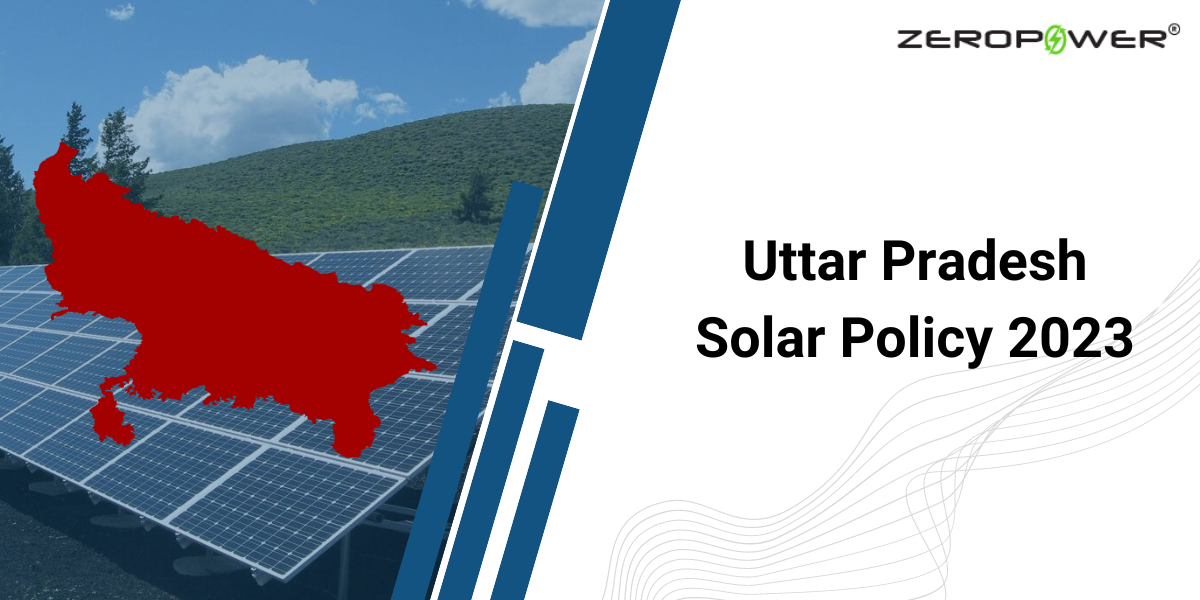Uttar Pradesh Solar Energy Policy: Fostering Clean and Sustainable Power Generation
Uttar Pradesh, India’s most populous state, is poised to tap into its vast solar energy potential as a significant step towards a greener and more sustainable future. Recognizing the abundance of sunshine, extensive land resources, and surging power demand, the state government has formulated an ambitious solar energy policy. The primary goal is to provide cost-effective and reliable electricity to the people of Uttar Pradesh, while simultaneously reducing dependence on fossil fuels and embracing renewable energy sources.
The Uttar Pradesh Solar Energy Policy-2023 is set to remain in effect for five years or until a new policy is announced. At its core, the policy aims to achieve an impressive target of 22,000 MW of solar power projects by 2026-27. This target will be pursued through a mix of 4,300 MW from rooftop solar projects and a substantial 17,700 MW from utility-scale solar projects. In addition to this, the policy envisions the development of solar parks, solar cities, solarization of agriculture feeders and tube wells, and the promotion of energy storage systems.
A key highlight of the policy is its provision of subsidies and incentives for rooftop solar projects across residential, institutional, and social sectors. Homeowners can avail a subsidy of Rs 15,000 per kW, capped at Rs 30,000 per consumer. This subsidy will be administered by the Uttar Pradesh New and Renewable Energy Development Agency (UPNEDA), the nodal agency responsible for policy implementation. Furthermore, in conjunction with the central financial assistance provided by the Ministry of New and Renewable Energy (MNRE) under the Rooftop Solar Programme Phase II scheme, residential consumers can benefit from an additional CFA of Rs 18,000 per kW or 40% of the benchmark cost/tender cost, whichever is lower.
The policy also extends various incentives to commercial and industrial sectors, including exemptions from electricity duty for a decade, net metering, banking facility, waiver of wheeling and transmission charges, and cross-subsidy surcharge for rooftop solar projects. Moreover, the policy permits the sale of excess power generated from rooftop solar projects to third parties within the state.
In terms of utility-scale solar projects, the policy encourages their development through competitive bidding, captive consumption, third-party sales, and bundling with thermal power. The establishment of ultra-mega solar parks, each with a minimum capacity of 500 MW, is also promoted across various regions of the state. To incentivize utility-scale solar projects, the policy offers benefits such as exemption from stamp duty on land registration, a 10-year electricity duty waiver, and a streamlined single-window clearance mechanism.
The policy extends its vision to foster solar cities by providing financial and technical assistance for preparing master plans and implementing solar projects in urban areas. Ayodhya has been earmarked as the pilot model solar city, and 16 other Nagar Nigam cities are identified as potential solar cities. Additionally, the policy seeks to cover approximately 13.5 lakh houses with rooftop solar plants during its tenure.
For the agricultural sector, the policy aims to solarize segregated agriculture feeders and grid-connected private tube wells, providing farmers with reliable and affordable power. Furthermore, the installation of utility-scale solar systems with four-hour battery storage systems is incentivized with a state subsidy of Rs 2.5 crore per MW.
In line with the policy’s holistic approach, it emphasizes creating employment opportunities and promoting skill development in the renewable energy sector. The plan is to train 30,000 youth as Surya Mitra at UPNEDA training centers over the next five years. Additionally, the policy encourages research and development collaborations with academic institutions and industry stakeholders.
The Uttar Pradesh Solar Energy Policy-2023 stands as a comprehensive and ambitious framework, showcasing the state government’s unwavering commitment to fostering clean and green energy practices. It is expected to invigorate the solar energy sector in Uttar Pradesh and contribute significantly to the national target of achieving 450 GW of renewable energy capacity by 2030. Through this initiative, Uttar Pradesh strides forward as a leader in embracing sustainable power generation for a brighter future.
